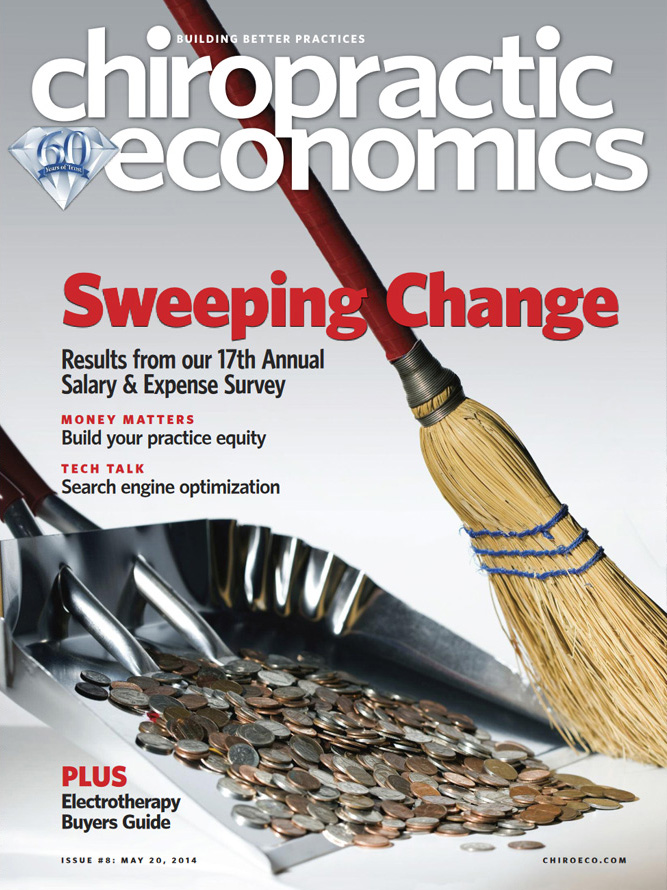By: Steven Abernathy and Brian Luster
Download a PDF version of this article

Creating a solid wealth plan for the new economy.
Today’s challenges in the practice and business of medicine include a national healthcare overhaul, EHR, and more patients to care for as the number of primary-care physicians decreases. At first, this seems to indicate that chiropractors will have to work more to receive less. And this may be especially true for those who neglect long-term planning.
Still, having a financial game plan is only one component of working smart — albeit a large one. Some families just seem to get it right; they make their money and they keep it. But given the demands of running a practice, business expenses, and life’s surprises, how is this even possible?
People who manage their personal wealth effectively tend to treat their resources as assets in a corporation. Still, many investors don’t think about their personal assets in this manner — even though it works.
Affluent people and their families who assess their wealth through a corporate lens make certain the operation of the assets (money, property, holdings) are not only managed well in this generation but will be robust in the next.
Today’s chiropractor who is building a practice (or who has already created one) has an opportunity to employ strategic wealth planning in asset management as well as in estate, tax, and legal decisions. An early commitment to creating a personal wealth enterprise could be the difference between retiring well or not retiring at all.

While independent investors are tempted to do everything themselves, take note of the opportunity cost when an integrated plan is lacking. Not only can costly mistakes be made by overpaying fees but the absence of relatively simple legal and tax structures could be the difference between a high tax bill and sound asset protection.
The following steps are crucial for a solid wealth plan.
Start early. There’s a reason this practice is encouraged and emphasized by professional investors and the financial media across the board: To accumulate wealth, you first need to set it aside so it can grow.
Hire the best. So-called “financial advisors” abound — but who are the best? Experience in the professional investment arena can’t be faked. Those who can produce an audited track record of their performance are professional investors.
While it can be overwhelming to discern who does what, it is essential to accurately determine a wealth manager’s experience in optimizing wealth game plans. Anyone managing money and other assets should agree to sign a fiduciary oath. If he or she refuses, do not to engage their services.
Be aware. Innovations in technology allow every investor who participates in a wealth enterprise system to assess the state of their assets around the clock. They can track the progress of their holdings over time and always get a clear readout of what’s happening where. There is no substitute for awareness.
Focus. Sound decision-making, oversight, and preparation for a strategic succession plan require focus and commitment from participants. This requires communication between family members and perhaps with outside parties who have administrative or managerial roles.
Understand key roles. Who is involved in managing day-to-day affairs both at the office and within the family? At the onset, a large staff may not be feasible; however, as a practice grows and prospers, more people may be employed — and thus have access to what may be sensitive information. Know how this is managed, what the checks and balances are, and what each employee with financial responsibility and authority does.
Connect the dots. Knowing who is effective in your wealth management plan is only one component; it is also crucial to have an overview of the activity flow of your wealth. If there is a team to be managed, who is in charge? The family enterprise generally acts as the CFO, whereas the patriarch or matriarch of the family usually takes the role of CEO.
Employ strategic, purposeful management. Pay attention to detail, regularly review what’s working (and what isn’t), and commit to regular communication and periodic reviews.
Stick to the plan. The more clarity and integration that exist between investments, tax strategies, legal structures, and estate plans, the higher the chances are of optimizing the family’s overall wealth picture. Budgeting is one facet of this plan. Another is sticking to specific goals, and adjusting those goals over time.
For example: You may be making contributions to an educational 529 plan. Once the education of heirs is completed, the contributions could go to a less restrictive account as 529s must be used for tuition, fees, room and board, books, and equipment required for study.
No two wealth plans are alike; however, every investor who mindfully executes these steps is taking an active role in preparation for an uncertain future. Practicing chiropractic may have financial rewards, but reaping financial freedom for retirement and subsequent generations is not guaranteed.
Taking active steps now to create a wealth plan means more peace of mind, more time to treat patients, and less paperwork later.
Steven Abernathy and Brian Luster co-founded the Abernathy Group II Family Office and the country’s first Physician Family Office (PFO). They sell no products, receive no commissions, and are independent, governed by an advisory board composed entirely of thought leaders. They can be contacted through abernathygroupfamilyoffice.com.
Click here to view this article in the original magazine publication


